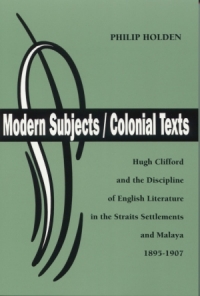Hugh Clifford and the Discipline of English Literature
in the Straits Settlements and Malaya 1895-1907
Fiction written under colonialism at the turn of the nineteenth century continues to be a highly contested area of intellectual enquiry. Writers who put imperialism into focus—Rudyard Kipling, Rider Haggard, Joseph Conrad—are now also seen as important agents in creating and reinforcing notions of national culture and gender roles. Much recent colonial discourse analysis, however, has neglected writers who were part of colonial communities in favour of metropolitan travelers and visitors.
Hugh Clifford’s position as both colonial official and writer sets him apart from such contemporaries. His career as colonial administrator in the Malaya and Straits Settlements spanned five decades, and his Malayan short stories, novels and sketches draw an elaborate series of parallels between the act of governing the colony and the discipline of writing a literary text. In Modern Subjects/Colonial Texts Philip Holden places Clifford’s writing in the context of the British "Forward Movement" in the Malay Peninsula, the evolving strategies of colonial governance, and their reception and reinscription by colonial elites.
What makes Holden’s study especially interesting is his careful analysis not only of Clifford’s unique role as administrator and writer, but his probing of Clifford’s doubts about the colonial enterprise. The central contradiction of colonialism pervades his fiction. In its late nineteenth-century guise colonialism promised improvement and the uplifting of subject peoples, yet it could not admit them to a position of social equality since at that moment the basis for colonialism would vanish. Holden reveals how the experience as a colonial administrator made Clifford suspicious of the economic expediency which often underlies the rhetoric of mission and duty. Clifford also comes to have doubts about the success of masculinity as a practice of the regulation of the self. As the last chapter of Holden's study shows, such doubts and contradictions were exploited in the reception of Clifford's texts by colonial elites such as the Straits Chinese.
Interweaving constructions of masculinity, femininity, race, bodily purity in Clifford’s fiction and their reinscription by non-European bourgeois communities create a complex mixture of complicity and resistance, one Holden believes might find surprising affinities with our own world at the turn of the twentieth century.

$17.95 Original Paperback 200 pp.
2000 0-944318-13-4 Acid-Free Paper
No. 14 in the 1880-1920 British Authors Series
Also an E-Book at Johns Hopkins's Project MUSE
E-Book 978-0-944318-66-9
